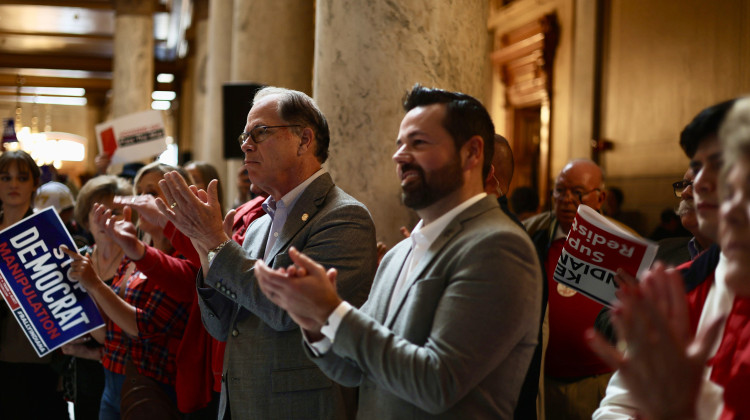
The Indiana State Department of Health conducted drive-thru testing in early April in Merrillville for first-responders and other health care workers.
Justin Hicks/IPB NewsThe Indiana State Department of Health reported 31 additional deaths Wednesday, bringing the state’s total to 661. The state announced more than 12,000 total confirmed cases, with more than 69,000 Hoosiers tested.
Indiana Restaurants Estimated To Lose Nearly $1 Billion In April Sales
Indiana’s “Stay-At-Home” order has been in place for about a month, drastically reducing operations in the hospitality industry. Restaurants in the state are estimated to lose nearly $1 billion in sales in April.
While some restaurants have shifted to carry-out services, many have cut worker’s hours or let employees go.
So far, about 2 percent of restaurants in a recent National Restaurant Association survey say they have permanently closed. That number is expected to rise to 4 percent in the next 30 days.
Indiana Restaurant and Lodging Association President Patrick Tamm says federal aid from the Paycheck Protection Program has been scarce with very few restaurants receiving money in the state.
Obstacles Remain As Indiana Tries To Reach Testing Goal
State Health Commissioner Dr. Kris Box says there are enough labs up and running across Indiana to do the number of necessary COVID-19 tests the state is aiming for – 6,300 a day.
But Box says there are still obstacles to actually conducting those tests.
The state is urging health care providers to order tests for anyone who is symptomatic for COVID-19. But Box says one challenge is identifying sites statewide where those tests can be administered.
Ball State Planetarium Computers Helping With Coronavirus Research
While the dome at the Ball State University planetarium is dark and its seats are empty because of COVID-19 restrictions, its computers are still contributing to scientific research. They’re linked to a research lab that’s studying the protein structure of the novel coronavirus.
At the Charles W. Brown Planetarium, it takes several computers to digitally project 4K images onto the 52-foot dome for public shows.
Planetarium director Dayna Thompson says nine of those computers are now connected to a research effort called Rosetta@home. It’s part of a network creating a “virtual supercomputer” that is currently helping the Baker Laboratory at the University of Washington map the structure of proteins in the coronavirus.
“So they’re using this computer power to predict the three-dimensional shape of proteins, which are really the building blocks of life,” Thompson says. “And that’s important to understanding COVID-19 and producing new or stable mini proteins that could then be used as therapeutics or diagnostics to help with this.”
Children's Commission Discusses Changes And Limitations Due To Virus
The Commission on Improving the Status of Children met virtually Wednesday to talk about efforts to help children and families in Indiana during the pandemic.
Indiana Department of Mental Health and Addictions Director Jay Chaudhary says there have been some positives, including advancements in telehealth.
"People that otherwise would not have accessed services, are able to access them because they can do it from their own home," says Chaudhary.
The state restricted courts but kept some operating to address essential cases, including child welfare hearings. Indiana Supreme Court Justice Loretta Rush says moving forward, questions remain about what to open and what should stay closed.
All IN: Are We Making Progress Against COVID-19?
Gov. Eric Holcomb’s “Stay-At-Home” order has been in effect for four weeks now. What progress has been made against COVID-19, and what will life look like in the next four weeks?
All IN talked to a reporter about the rubric that state leaders are using to make decisions about when and how to reopen the economy. Medical experts gave an update on whether or not we have flattened the curve, and if hospitals have caught their breath yet. And an economist talked about Indiana’s path to economic recovery.
READ MORE: Can I Go For A Walk? Here's What The Updated 'Stay-At-Home' Order Really Does
Join the conversation and sign up for the Indiana 2020 Two-Way. Text "elections" to 73224. Your comments and questions in response to our weekly text help us find the answers you need on COVID-19 and the 2020 election.
LEE MAS: ¿Puedo Salir A Caminar? Esto Es Lo Que Significa Una Orden De Permanecer En Casa
Deaconess Health Restarting Some Services
Deaconess Health System says it’s resuming services that had been suspended due to the COVID-19 outbreak.
Deaconess says the reopening includes more in-person and elective patient care in the health system’s hospitals and outpatient facilities.
In a release, Deaconess CEO Shawn McCoy said the region has been “successful in abiding by social distancing and ‘Stay-At-Home orders’, resulting in fewer positive cases of COVID-19 than earlier projections suggested were possible.”
Allen County Officials Provide Business Outlook, Reiterate Support For CDC Guidelines
Fort Wayne and Allen County officials gathered Wednesday to provide an update to the community.
Allen County Commissioner Nelson Peters sounded optimistic about the idea of “reopening the government,” but noted that, until officials are given the greenlight from medical experts and Governor Holcomb, they will continue to encourage CDC guidelines.
“We have to continue to follow the prescribed protocols. We’ve got to pay attention to what the CDC is telling us, and we have to practice the hand washing and social distancing requirements they’ve laid out. But like I said, we will emerge stronger,” Peters says.
Tippecanoe County Officials Say COVID-19 Testing, Contact Tracing Key For Reopening Community
Tippecanoe County Health Officer Dr. Jeremy Adler Wednesday says the pace of the county’s reopening process would depend upon increased COVID-19 testing capability and substantial contact tracing for confirmed novel coronavirus cases.
“One of the things we hope to accomplish in our contact tracing program is if any of those individuals who are in close contact are in quarantine do develop symptoms, we want to have a system in place where they can be tested quickly, so we can find out if they also have COVID-19,” Adler says.
Adler says close to 3,000 COVID-19 tests have been conducted in the county.
Ball State Eyes July Or October For Rescheduled Graduation Ceremonies
Ball State University says it will likely reschedule graduation ceremonies canceled because of COVID-19 restrictions for either the summer or the fall, depending on what state recommendations are still in place.
When Ball State canceled its early May spring commencement, it sent out a survey on what to do next. The school says the more than 4,000 responses overwhelmingly showed people wanted an in-person ceremony, not a virtual effort.
Ball State wants to combine the missed spring graduates with summer graduates for a ceremony on July 18. But in a statement, President Geoffrey Mearns says the state may still not allow large celebrations in July. He says a back-up date of October 10 is also a possibility.
Coronavirus Count In Noble County Largely Linked To Long-Term Care
State officials said technology glitches kept the state’s coronavirus numbers artificially low Wednesday, but Allen County’s own count showed a continued rise.
As of Wednesday afternoon, 350 Allen County residents have now been infected with the virus, and 32 residents have died.
Noble County Health Commissioner Dr. Terry Gaff told KPC News on Wednesday that the recent jump in cases was largely due to outbreaks at area long-term care facilities and rehab facilities.
Contact Lauren at lchapman@wfyi.org or follow her on Twitter at @laurenechapman_.
This is a rapidly evolving story, and we are working hard to bring you the most up-to-date information. However, we recommend checking the websites of the Centers for Disease Control and Prevention or the Indiana State Department of Health for the most recent numbers of COVID-19 cases.
 DONATE
DONATE







 Support WFYI. We can't do it without you.
Support WFYI. We can't do it without you.